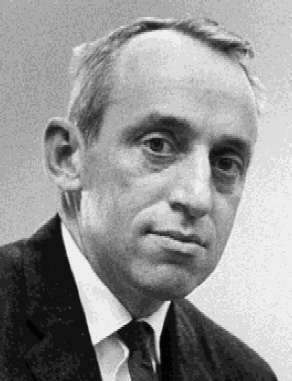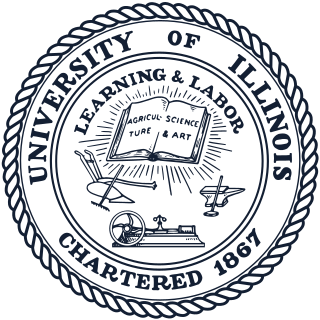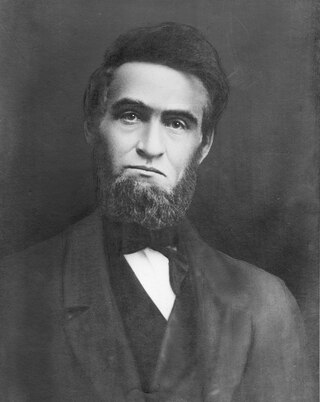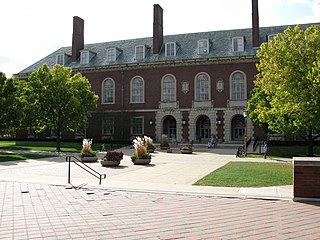
James Tobin was an American economist who served on the Council of Economic Advisers and consulted with the Board of Governors of the Federal Reserve System, and taught at Harvard and Yale Universities. He contributed to the development of key ideas in the Keynesian economics of his generation and advocated government intervention in particular to stabilize output and avoid recessions. His academic work included pioneering contributions to the study of investment, monetary and fiscal policy and financial markets. He also proposed an econometric model for censored dependent variables, the well-known tobit model.
Social statistics is the use of statistical measurement systems to study human behavior in a social environment. This can be accomplished through polling a group of people, evaluating a subset of data obtained about a group of people, or by observation and statistical analysis of a set of data that relates to people and their behaviors.

The University of Illinois Urbana-Champaign is a public land-grant research university in the Champaign–Urbana metropolitan area, Illinois, United States. It is the flagship institution of the University of Illinois system and was established in 1867. With over 53,000 students, the University of Illinois is one of the largest public universities by enrollment in the United States.

Jonathan Baldwin Turner was an American classical scholar, an ordained minister, a professor, a campaigner for the abolition of slavery, and political activist. He also campaigned in favor of land grant universities. In 1835, Turner married Rhodolphia Kibbe and they had seven children.

Gene V Glass is an American statistician and researcher working in educational psychology and the social sciences. According to the science writer Morton Hunt, he coined the term "meta-analysis" and illustrated its first use in his presidential address to the American Educational Research Association in San Francisco in April, 1976. The most extensive illustration of the technique was to the literature on psychotherapy outcome studies, published in 1980 by Johns Hopkins University Press under the title Benefits of Psychotherapy by Mary Lee Smith, Gene V Glass, and Thomas I. Miller. Gene V Glass is a Regents' Professor Emeritus at Arizona State University in both the educational leadership and policy studies and psychology in education divisions, having retired in 2010 from the Mary Lou Fulton Institute and Graduate School of Education. From 2011 to 2020, he was a senior researcher at the National Education Policy Center, a Research Professor in the School of Education at the University of Colorado Boulder, and a Lecturer in the Connie L. Lurie College of Education at San Jose State University. In 2003, he was elected to membership in the National Academy of Education.
Education policy consists of the principles and policy decisions that influence the field of education, as well as the collection of laws and rules that govern the operation of education systems. Education governance may be shared between the local, state, and federal government at varying levels. Some analysts see education policy in terms of social engineering.

Margaret A. Haley was a teacher, unionist, and Georgist land value tax activist, who was dubbed the "lady labor slugger". Haley was the first business representative of the Chicago Teachers Federation and a pioneer leader in organizing schoolteachers. During her long career with the CTF, Haley fought to correct tax inequalities, increase the salaries of teachers, and expose unfair land leasing by the Chicago Board of Education.

The School of Information Sciences, also The iSchool at Illinois, is an undergraduate and graduate school at the University of Illinois Urbana–Champaign. Its Master of Science in Library and Information Science is currently accredited in full good standing by the American Library Association. The school is a charter member of the iSchool initiative.
Campbell's law is an adage developed by Donald T. Campbell, a psychologist and social scientist who often wrote about research methodology, which states:
The more any quantitative social indicator is used for social decision-making, the more subject it will be to corruption pressures and the more apt it will be to distort and corrupt the social processes it is intended to monitor.

Nicholas C. Burbules is a Gutgsell Endowed Professor of Education Policy, Organization and Leadership and an affiliate of the Unit for Criticism and Interpretative Theory at the University of Illinois at Urbana-Champaign. He is the director of the Ubiquitous Learning Institute and has served as Editor of the journal Educational Theory since 1991.
Anil K. Bera is an Indian-American econometrician. He is Professor of Economics at University of Illinois at Urbana–Champaign's Department of Economics. He is most noted for his work with Carlos Jarque on the Jarque–Bera test.
Virginia Dominguez is a political and legal anthropologist. She is currently the Edward William and Jane Marr Gutgsell Professor of Anthropology at the University of Illinois at Urbana-Champaign.
Elizabeth Knight Dawson is a biostatistician and biostatistics textbook author.
Scott Althaus is a professor of political science and of communication at the University of Illinois at Urbana-Champaign and the director of the Cline Center for Advanced Social Research at the University.
Martin D. Burke is the May and Ving Lee Professor for Chemical Innovation at the University of Illinois at Urbana–Champaign, and Associate Dean of Research in the Carle Illinois College of Medicine. His research has involved the development of antifungal treatments for cystic fibrosis, and the development of a COVID-19 test that the University of Illinois has used over one million times.

The University Library at the University of Illinois Urbana-Champaign comprises a network of physical and digital libraries. It provides resources and services to the university's students, faculty, staff, and the broader academic community.
Responsive evaluation is an approach to measure the effectiveness of educational programs developed by Robert E. Stake. This approach enables to evaluate the educational and other programs by comparing the program activity, the program uniqueness, and the social diversity of the people.
Joan Huber is an American sociologist and professor emeritus of sociology at Ohio State University. Huber served as the 79th president of the American Sociological Association in 1989. Huber taught at the University of Notre Dame from 1967 to 1971, eventually moving to Illinois, where she taught at the University of Illinois at Urbana/Champaign. While instructing numerous sociology courses at the University of Illinois at Urbana/Champaign, Huber served as the director of Women's Studies Program for two years (1978–1980), and then became the head of the Department of Sociology in 1979 until 1983. In 1984, Huber left Illinois for an opportunity at the Ohio State University, where she became the dean of the College of Social and Behavioral Sciences, coordinating dean of the Colleges of the Arts and Sciences, and senior vice president for academic affairs and university provost. During her time, Huber was president of Sociologists for Women in Society from 1972 to 1974, the Midwest Sociological Society from 1979 to 1980, and the American Sociological Association from 1988 to 1989. Being highly recognized for her excellence, in 1985 Huber was given the Jessie Bernard Award by the American Sociological Association. Not only was Huber an instructor of sociology at multiple institutions or president of different organization, she also served different editorial review boards, research committees, and counseled and directed many institutions on their sociology departments.
Lucius Jefferson Barker was an American political scientist. He was the Edna Fischel Gellhorn Professor and chair of the political science department at Washington University in St. Louis, and then the William Bennett Munro Professor of Political Science at Stanford University. He was an influential scholar of constitutional law and civil liberties, as well as race and ethnic politics in the United States. He published works on civil liberties in the United States and systemic racism. He was also involved with several presidential campaigns, and he wrote books about the Jesse Jackson 1984 presidential campaign, for which he was a convention delegate.
Arthur "Art" J. Baroody is an educational psychologist, academic, and an expert in mathematics education research. He is a Professor Emeritus of Curriculum and Instruction at the University of Illinois at Urbana-Champaign, and a Senior Research Fellow in Morgridge College of Education (COE) at the University of Denver.








